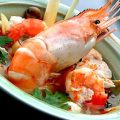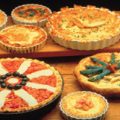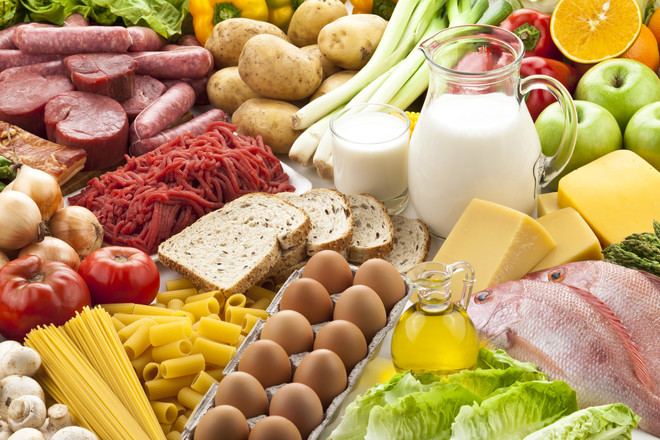 What vitamins should you take? Photo:Getty ImagesThe awakening of nature finds us in a period of acute vitamin deficiency. This affects our general well-being, the condition of our skin, hair, and nails. We must help ourselves with a balanced diet - after all, health and beauty begin with the stomach. To do this, you need to carefully monitor the intake of essential vitamins and minerals. The spring diet is quite flexible and suits any taste. There are no products in it that must be automatically excluded from the diet. There is one basic rule - products should be selected in such a way that all groups of vitamins enter the body. Vitamin A is found in liver, butter, cheese, milk, cottage cheese, eggs, fish, pumpkin, carrots, sea buckthorn. Necessary: for vision and bone regeneration. Note: Alcohol in any quantity prevents the absorption of vitamin A. B vitamins Found in cereals, chicken, beef, liver, kidneys, peanuts, cod, salmon, soy. Necessary: to break down fats, normalize metabolism, enrich the blood. Note: Vitamin B6 is not absorbed if a woman uses hormonal contraceptives. In this case, this vitamin should be taken additionally. Vitamin C Found in citrus fruits, rose hips, kiwi, black currants, green vegetables, sauerkraut. Necessary: to stimulate the body's resistance system, helps absorb iron, and therefore maintains hemoglobin levels. Note: excess is dangerous for women whose families have hereditary diseases such as gout and salt deposits.
What vitamins should you take? Photo:Getty ImagesThe awakening of nature finds us in a period of acute vitamin deficiency. This affects our general well-being, the condition of our skin, hair, and nails. We must help ourselves with a balanced diet - after all, health and beauty begin with the stomach. To do this, you need to carefully monitor the intake of essential vitamins and minerals. The spring diet is quite flexible and suits any taste. There are no products in it that must be automatically excluded from the diet. There is one basic rule - products should be selected in such a way that all groups of vitamins enter the body. Vitamin A is found in liver, butter, cheese, milk, cottage cheese, eggs, fish, pumpkin, carrots, sea buckthorn. Necessary: for vision and bone regeneration. Note: Alcohol in any quantity prevents the absorption of vitamin A. B vitamins Found in cereals, chicken, beef, liver, kidneys, peanuts, cod, salmon, soy. Necessary: to break down fats, normalize metabolism, enrich the blood. Note: Vitamin B6 is not absorbed if a woman uses hormonal contraceptives. In this case, this vitamin should be taken additionally. Vitamin C Found in citrus fruits, rose hips, kiwi, black currants, green vegetables, sauerkraut. Necessary: to stimulate the body's resistance system, helps absorb iron, and therefore maintains hemoglobin levels. Note: excess is dangerous for women whose families have hereditary diseases such as gout and salt deposits. Vitamin E is found in green vegetables, eggs,milk, vegetable oil, sprouted grain. Necessary: to maintain the performance of muscles, vascular and endocrine systems. Note: vitamins E and A are effectively consumed in combination, they mutually enhance each other's effects. Vitamin D Contained in sea fish, seaweed, dairy products. Necessary: to strengthen bones, retain moisture by cells, improve the condition of the skin. Note: a person needs vitamin D only in sunless weather, because this vitamin is synthesized by the body under the influence of sunlight. Tip 1. It is important to remember that in the spring the body experiences serious vitamin deficiency stress, so you should not get carried away with diets - spring nutrition should be varied. Tip 2.
Vitamin E is found in green vegetables, eggs,milk, vegetable oil, sprouted grain. Necessary: to maintain the performance of muscles, vascular and endocrine systems. Note: vitamins E and A are effectively consumed in combination, they mutually enhance each other's effects. Vitamin D Contained in sea fish, seaweed, dairy products. Necessary: to strengthen bones, retain moisture by cells, improve the condition of the skin. Note: a person needs vitamin D only in sunless weather, because this vitamin is synthesized by the body under the influence of sunlight. Tip 1. It is important to remember that in the spring the body experiences serious vitamin deficiency stress, so you should not get carried away with diets - spring nutrition should be varied. Tip 2. There is an opinion that spring fruits and vegetablesno vitamin wealth. This is only partly true. Of course, they retain vitamins, although in smaller quantities. In addition, all fruits and vegetables in the spring are still rich in fiber, which helps remove waste and toxins from the body. Fruits and vegetables should be included in the daily diet. It is desirable that they make up a special meal. Fruits are better absorbed on an empty stomach, half an hour before a meal. Tip 3. It is necessary to take into account the compatibility of products by digestion time. In this regard, vegetables that are most useful in the form of a salad mix should only be combined with meat - these are products of "long processing". While bread and pasta are absorbed by the body much faster. It is better to eat them with cheese or greens. Tip 4. In the spring, you should not adhere to the vegetarian fashion. At least three to four times a week, the female body needs meat and animal products. Along with complete proteins, they contain fats and so-called extractive substances, which serve as strong stimulants for the secretion of digestive juices. Thanks to them, food is better absorbed, and the metabolism becomes balanced. Meat should be of good quality and fresh. Tip 5. In the spring, drink as much fruit drinks from jam, compotes made from frozen fruits, and green tea as possible. Limit your consumption of coffee and alcoholic beverages. Tip 6. Vitamins cannot be stocked up on. They must be consumed daily. Ideally, a balanced diet should include an accurate analysis of vitamin consumption during the day. Unfortunately, this principle is difficult to apply in practice.
There is an opinion that spring fruits and vegetablesno vitamin wealth. This is only partly true. Of course, they retain vitamins, although in smaller quantities. In addition, all fruits and vegetables in the spring are still rich in fiber, which helps remove waste and toxins from the body. Fruits and vegetables should be included in the daily diet. It is desirable that they make up a special meal. Fruits are better absorbed on an empty stomach, half an hour before a meal. Tip 3. It is necessary to take into account the compatibility of products by digestion time. In this regard, vegetables that are most useful in the form of a salad mix should only be combined with meat - these are products of "long processing". While bread and pasta are absorbed by the body much faster. It is better to eat them with cheese or greens. Tip 4. In the spring, you should not adhere to the vegetarian fashion. At least three to four times a week, the female body needs meat and animal products. Along with complete proteins, they contain fats and so-called extractive substances, which serve as strong stimulants for the secretion of digestive juices. Thanks to them, food is better absorbed, and the metabolism becomes balanced. Meat should be of good quality and fresh. Tip 5. In the spring, drink as much fruit drinks from jam, compotes made from frozen fruits, and green tea as possible. Limit your consumption of coffee and alcoholic beverages. Tip 6. Vitamins cannot be stocked up on. They must be consumed daily. Ideally, a balanced diet should include an accurate analysis of vitamin consumption during the day. Unfortunately, this principle is difficult to apply in practice.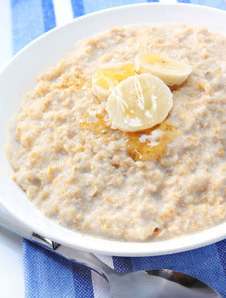 However, every woman in the evening, without going into details"mathematical calculations", you need to remember the menu for the day and understand which group of vitamins it "bypassed" in its diet. And if on some day you did not eat fish, liver or nuts, then take care of the diet with B. An irreplaceable and rich source of B vitamins is oats and rolled oats, drinks from which are especially necessary for women in early spring. It is known that many European women, following the example of English women, eat oatmeal for breakfast. It helps the intestines work, controls the absorption of fat by the body. In addition to vitamins, the composition of oatmeal includes potassium, magnesium, phosphorus, chromium, iron, manganese, iodine. Oatmeal contains such a rare component as silicon - it prevents hair loss and strengthens their roots, fluoride compounds contained in oatmeal make teeth healthy. Spring dizziness, weakness and depression are most often associated with a decrease in the level of hemoglobin, for which iron is responsible. Nuts help absorb iron - do not forget about them in the spring. Antonov apples occupy a special place - the only fruit that guarantees excellent "absorption" of iron. Calcium deficiency is the most common cause of spring problems associated with brittle bones and tooth decay.
However, every woman in the evening, without going into details"mathematical calculations", you need to remember the menu for the day and understand which group of vitamins it "bypassed" in its diet. And if on some day you did not eat fish, liver or nuts, then take care of the diet with B. An irreplaceable and rich source of B vitamins is oats and rolled oats, drinks from which are especially necessary for women in early spring. It is known that many European women, following the example of English women, eat oatmeal for breakfast. It helps the intestines work, controls the absorption of fat by the body. In addition to vitamins, the composition of oatmeal includes potassium, magnesium, phosphorus, chromium, iron, manganese, iodine. Oatmeal contains such a rare component as silicon - it prevents hair loss and strengthens their roots, fluoride compounds contained in oatmeal make teeth healthy. Spring dizziness, weakness and depression are most often associated with a decrease in the level of hemoglobin, for which iron is responsible. Nuts help absorb iron - do not forget about them in the spring. Antonov apples occupy a special place - the only fruit that guarantees excellent "absorption" of iron. Calcium deficiency is the most common cause of spring problems associated with brittle bones and tooth decay. Thus, the body needs not onlyvitamins, but also microelements. Despite a varied diet, in the spring the body should be "nourished" with multivitamins. There are many of them now, and, naturally, each company praises its products. They vary in composition. When choosing vitamins, you should choose those that are right for you. For example, if you do not like milk or rarely eat seafood, then multivitamins with a predominance of vitamin A, E, calcium and iodine will suit you. I would advise starting preparations for spring from the end of winter. Initially, it is advisable to "take" a course of Aevit. Usually it is used for 10 days, twice a day, one capsule, 20 minutes before meals. Then you should take fish oil for two to three weeks. Fish oil is available in natural form and with various mineral supplements. You can choose one that includes elements that are less common in your diet. During the next month - and it will be the end of March - April - it is time to switch to multivitamins. Allergy sufferers are better off taking vitamins and microelements separately. In the vitamin preparation "DUOVIT" vitamins and microelements are divided into red and blue tablets, which are taken at different times of the day. "OLIGOVIT" and "MAKROVIT", in my opinion, are some of the most balanced "spring" vitamins of the latest generation. You should definitely not take vitamins in larger doses than recommended in the annotation. Doses can be increased only on the recommendation of a doctor in the postoperative period or after serious illnesses. Hypervitaminosis can be worse than vitamin deficiency and leads to a violation of mineral metabolism. It begins with nausea, dizziness, vomiting and leads to serious consequences. I will give just a few examples. "Excess" vitamin C is deposited in the renal tubules in the form of salt, sand, stones.
Thus, the body needs not onlyvitamins, but also microelements. Despite a varied diet, in the spring the body should be "nourished" with multivitamins. There are many of them now, and, naturally, each company praises its products. They vary in composition. When choosing vitamins, you should choose those that are right for you. For example, if you do not like milk or rarely eat seafood, then multivitamins with a predominance of vitamin A, E, calcium and iodine will suit you. I would advise starting preparations for spring from the end of winter. Initially, it is advisable to "take" a course of Aevit. Usually it is used for 10 days, twice a day, one capsule, 20 minutes before meals. Then you should take fish oil for two to three weeks. Fish oil is available in natural form and with various mineral supplements. You can choose one that includes elements that are less common in your diet. During the next month - and it will be the end of March - April - it is time to switch to multivitamins. Allergy sufferers are better off taking vitamins and microelements separately. In the vitamin preparation "DUOVIT" vitamins and microelements are divided into red and blue tablets, which are taken at different times of the day. "OLIGOVIT" and "MAKROVIT", in my opinion, are some of the most balanced "spring" vitamins of the latest generation. You should definitely not take vitamins in larger doses than recommended in the annotation. Doses can be increased only on the recommendation of a doctor in the postoperative period or after serious illnesses. Hypervitaminosis can be worse than vitamin deficiency and leads to a violation of mineral metabolism. It begins with nausea, dizziness, vomiting and leads to serious consequences. I will give just a few examples. "Excess" vitamin C is deposited in the renal tubules in the form of salt, sand, stones.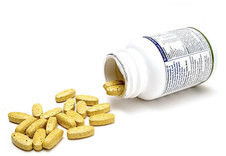 Vitamin C overdose may cause miscarriage in pregnant womenpregnant women, as ascorbic acid increases uterine contractions. Therefore, you can enjoy rose hips, black currants, citrus fruits, and kiwi not whenever you want, but once or twice a day in small portions. Poisoning is known from an overdose of vitamin A. Women should not take vitamin D separately - it is quite sufficient in multivitamins. In its "pure form", vitamin D is only necessary in early childhood. With the appearance of the first vegetables and fruits, you can stop feeding the body with multivitamins. Recipes for healing decoctions rich in vitamins of group B Oat decoction. Steam a full tablespoon of unpeeled oats in a thermos with one glass of boiling water. Leave overnight. Take a third of a glass 3 times a day 15 minutes before meals. For taste, you can add honey, jam or juice. Hercules-oat drink. Boil 3-4 spoons of rolled oats in a liter of water for 5-8 minutes. Rub through a sieve and add one and a half glasses of water, bring to a boil. Store in the refrigerator. Drink warm at least half a glass 2-3 times a day. Regardless of meals, at any time as desired. The most important microelements
Vitamin C overdose may cause miscarriage in pregnant womenpregnant women, as ascorbic acid increases uterine contractions. Therefore, you can enjoy rose hips, black currants, citrus fruits, and kiwi not whenever you want, but once or twice a day in small portions. Poisoning is known from an overdose of vitamin A. Women should not take vitamin D separately - it is quite sufficient in multivitamins. In its "pure form", vitamin D is only necessary in early childhood. With the appearance of the first vegetables and fruits, you can stop feeding the body with multivitamins. Recipes for healing decoctions rich in vitamins of group B Oat decoction. Steam a full tablespoon of unpeeled oats in a thermos with one glass of boiling water. Leave overnight. Take a third of a glass 3 times a day 15 minutes before meals. For taste, you can add honey, jam or juice. Hercules-oat drink. Boil 3-4 spoons of rolled oats in a liter of water for 5-8 minutes. Rub through a sieve and add one and a half glasses of water, bring to a boil. Store in the refrigerator. Drink warm at least half a glass 2-3 times a day. Regardless of meals, at any time as desired. The most important microelements
- Calcium is present in dairy products, figs and other dried fruits.
- Iron is found in meat, beans, buckwheat, liver, egg yolk, dried fruits and chocolate.
- Iodine comes from iodized salt and seafood.
- Bananas, wholemeal products, potatoes, cocoa and poultry are rich in magnesium.
- Zinc is found in fish, persimmon, cheese, beef and pork.





